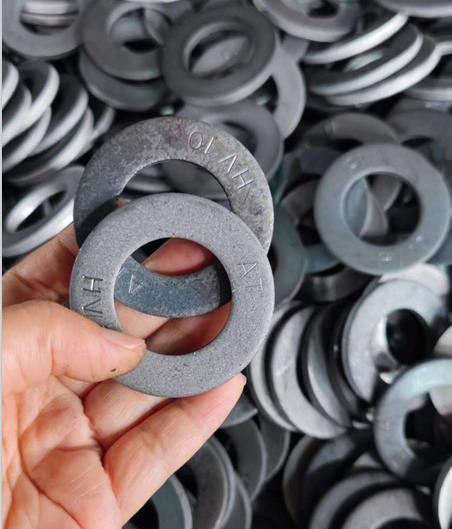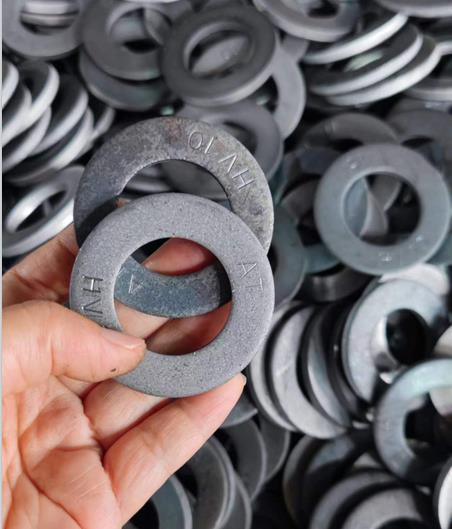3월 . 07, 2025 03:48
Back to list
din125 plain washer flat washer
Single coil spring washers, also known as single coil lock washers, are an integral component in bolted assemblies where vibration-induced loosening is a concern. Originating from a simple yet highly effective design, they feature a helical shape that exerts a spring force upon installation. This force increases friction between the bolt thread and nut or tapped hole, providing resistance against rotations that could cause the assembly to loosen over time.
Professional installers and maintenance technicians often laud the ease of installation associated with single coil spring washers. They are straightforward to integrate into assembly processes, often requiring no specialized tools beyond standard torque wrenches to ensure proper installation. This characteristic makes them particularly appealing in maintenance scenarios where prompt and efficient service is crucial. High trustworthiness with minimal need for re-tightening translates to a cost-effective solution across industries. Despite their many advantages, the choice of material for single coil spring washers must be carefully considered to match the application's environmental conditions. For instance, in corrosive environments or where exposure to moisture is prevalent, stainless steel versions provide superior corrosion resistance, significantly extending the life of the fastened assembly. Similarly, when dealing with electrical assemblies, phosphor bronze or other non-ferrous materials might be preferred to prevent electrical conductivity interference. It is this adaptability and proven reliability that continue to elevate the stature of single coil spring washers in construction and manufacturing industries worldwide. As a best practice, engineers must consider the material compatibility, environmental conditions, and mechanical requirements of each specific application to optimize the performance and longevity of the spring washer in use. In summary, single coil spring washers provide a trusted solution for maintaining joint integrity in various challenging environments. Their simple yet effective design ensures reliability while their material diversity allows them to be tailored for specific industrial requirements, making them a staple in precision engineering. As industries progress, the continuous innovation and improvement of these washers are expected to further solidify their role as an essential component in secure fastening solutions, demonstrating enduring expertise and trustworthiness in engineering applications.


Professional installers and maintenance technicians often laud the ease of installation associated with single coil spring washers. They are straightforward to integrate into assembly processes, often requiring no specialized tools beyond standard torque wrenches to ensure proper installation. This characteristic makes them particularly appealing in maintenance scenarios where prompt and efficient service is crucial. High trustworthiness with minimal need for re-tightening translates to a cost-effective solution across industries. Despite their many advantages, the choice of material for single coil spring washers must be carefully considered to match the application's environmental conditions. For instance, in corrosive environments or where exposure to moisture is prevalent, stainless steel versions provide superior corrosion resistance, significantly extending the life of the fastened assembly. Similarly, when dealing with electrical assemblies, phosphor bronze or other non-ferrous materials might be preferred to prevent electrical conductivity interference. It is this adaptability and proven reliability that continue to elevate the stature of single coil spring washers in construction and manufacturing industries worldwide. As a best practice, engineers must consider the material compatibility, environmental conditions, and mechanical requirements of each specific application to optimize the performance and longevity of the spring washer in use. In summary, single coil spring washers provide a trusted solution for maintaining joint integrity in various challenging environments. Their simple yet effective design ensures reliability while their material diversity allows them to be tailored for specific industrial requirements, making them a staple in precision engineering. As industries progress, the continuous innovation and improvement of these washers are expected to further solidify their role as an essential component in secure fastening solutions, demonstrating enduring expertise and trustworthiness in engineering applications.
Latest news
-
Top Choices for Plasterboard FixingNewsDec.26,2024
-
The Versatility of Specialty WashersNewsDec.26,2024
-
Secure Your ProjectsNewsDec.26,2024
-
Essential Screws for Chipboard Flooring ProjectsNewsDec.26,2024
-
Choosing the Right Drywall ScrewsNewsDec.26,2024
-
Black Phosphate Screws for Superior PerformanceNewsDec.26,2024
-
The Versatile Choice of Nylon Flat Washers for Your NeedsNewsDec.18,2024
Related News










